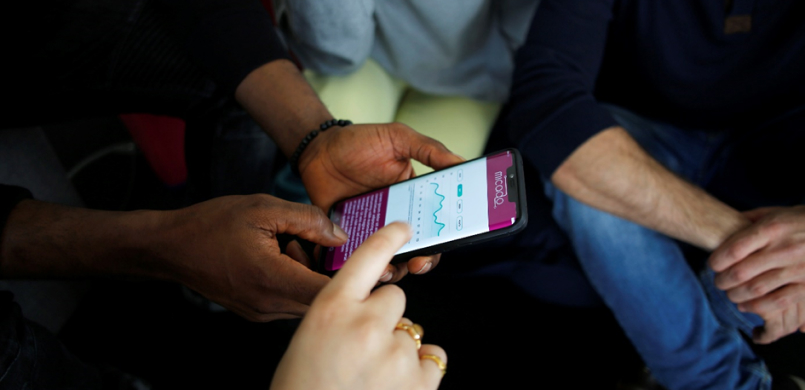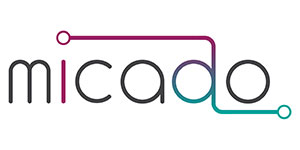
21 Dec The fourth and final piloting phase
MICADO is currently in the last piloting phase! This means the three MICADO applications are being tested by our target groups in order to receive information about which functionalities are already well implemented and which ones need to be improved further.
This is how the testing works:
Piloting started in May 2021 with our target groups of public authorities, civil society actors, and migrants. We used a structured approach to ask our target groups for their opinion. For this purpose, usability tests, workshops, phases of self-testing and discussion rounds were organised to give migrants and refugees, employees of public authorities and civil society actors the opportunity to provide feedback. Due to Covid-19 and the contact restrictions, the discussion rounds and workshop mainly took place in the digital format. However, when possible, piloting also happened face-to-face. For example, in Hamburg all piloting activities that involved migrants were conducted during physical meetings.
The MICADO software was installed locally and filled with local content, which included instructions on how to extend a residence permit, where and how to have a vocational qualification recognized, where to find help for physical or mental illnesses. Depending on the target groups, the content was made available in different languages (Dari, Arabic, German, English, Italian, Spanish, Chinese, Dutch).
In May and June, a comprehensive usability test took place whose findings were incorporated into a further technical development loop. Since July, the group of participants has been expanded and all interested stakeholders were invited to test MICADO.
In this last stage of piloting, all three target groups in each pilot city received an invitation to test the MICADO application and services for their respective group and were asked to fill in a questionnaire in order to provide feedback.
This is how the single pilot cities became active:
In Bologna, ASP City of Bologna and University of Bologna, in close cooperation, are working on spreading the knowledge about the app and engaging local public administrations, civil society organizations and migrants within the reception system.
During the tests, the colleagues are going to ask participants to try the app and fill in the evaluation questionnaire, that will allow the MICADO team to understand the effectiveness of the tool. The aim is to promote the autonomy of people and, at the same time, introduce a minimum level of digitalization through a better knowledge of the territory and the services offered.
In Antwerp, a newcomer often enters into various commitments with public administrations and civil society organizations. Therefore, in the city’s concept, a lot of thought has gone into how a newcomer can receive some kind of action plan containing duties like paperwork and appointments with various stakeholders but also services available. MICADO can take a supporting role in this. Extensive attention is paid to qualitative content in accordance with the ‘Klare Taal’ (i.e. clear language) guidelines and the daily experience of working with low-skilled and low-digital literacy migrants.
Antwerp is aiming at newcomers, first-line workers of SD & Atlas (counsellors and teachers), and other target groups such as NT2 workers and managements of NGOs.
The Hamburg digital solution will facilitate communication between the three most important stakeholder groups: employees of the authorities relevant for migration and integration processes, representatives of non-governmental organizations and initiatives that provide support services, and the new citizens themselves. For migrants, the app provides important information and support with formal processes in the domains of health, housing, education and work. For public administration employees, it digitizes and visualizes crucial data in a so-called Migrant Situation Monitor. Civil society organisations and other initiatives will be able to present their services in the app. After a first round of Usability Tests during summer, the updated version of the app is currently being tested by all user groups.
Prof. Dr. Jörg Noennig, Project Manager and Chair of Digital City Science, states
“We are pleased that MICADO has now become a functioning system that we have been able to use and test for the first time in real operation in our European partner cities in recent months – with success! We are confident that from the good interaction of the Hamburg participants, a solution will soon be ready for our city that will support the integration processes very effectively in the future.”
In Madrid, this phase of piloting is particularly interesting for the project because it involves a large number of migrants living in Madrid. In addition to migrants, public administrations and civil society organizations are also key agents when speaking about integration. In Madrid, special attention is put on the linguistic diversity of migrants. In Madrid, the app is being tested in Chinese and Arabic in addition to the local language. The app is also tested in its design, functionalities and as a digital tool.
Piloting is ongoing and will end at the beginning of January 2022. We are excited to see the results and share them with you as soon as they will be available!
What happens next? At the beginning of 2022, all feedback will be fed into the MICADO software and features will being technically refined, so that in the end of the project, we can offer a product that is of real benefit and added value for our target groups.
